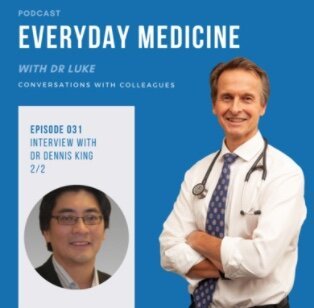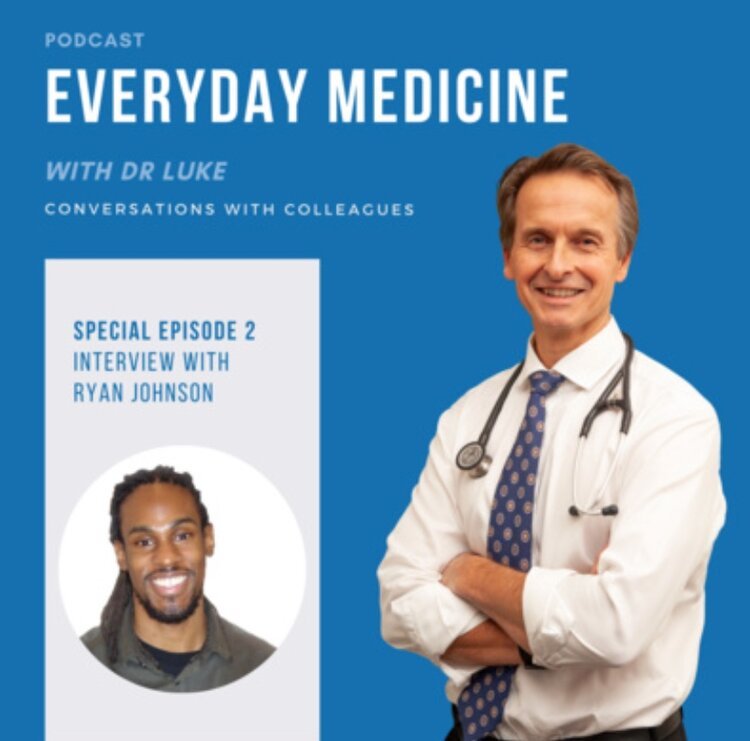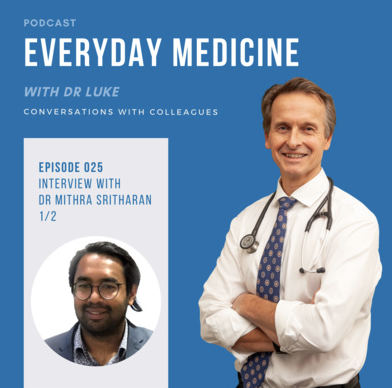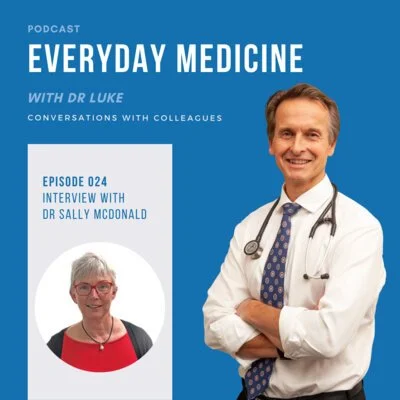Everyday Medicine by Dr Luke Crantock
Conversations with colleagues providing helpful ideas and advice in healthcare
Episode 35. The spleen and postsplenectomy syndrome with Dr Mohammed Al Souffi
The spleen performs a large number of important functions including processing and removal of opsonized pathogens, cellular maintenance, immunoglobulin production and the removal of effete worn out red blood cell. When removed either through trauma or for therapeutic indications the risk of overwhelming post splenectomy infection (OPSI) increases significantly; up to 58 times the general population in the setting of trauma and up to 1,100 times increased risk when for thalassaemia.
Episode 34. Atherosclerosis with Dr James Sapontis
Coronary artery disease caused by atherosclerosis is responsible for one heart attack every ten minutes in Australia. Not all plaques however are equally dangerous or vulnerable, and stable plaques may be asymptomatic and associated with low risk of coronary events contrasted with the unstable or ruptured plaque. To discuss this very interesting subject in more detail we are joined by Dr James Sapontis, experienced cardiologist and head of complex coronary intervention at Monash Heart who will consider:
Episode 33. New Advances in Cardiology with Dr James Sapontis
We are joined today by Dr James Sapontis, head of complex coronary intervention at Monash Heart and formerly trained through Mahi Missouri and Kings College London to discuss new advances in the field of cardiology.
Episode 32. Lung Cancer with Mr Cliff Choong
Lung cancer is a major problem facing Australian doctors representing 9% of all cancer diagnoses and with 12,200 new cases of lung cancer diagnosed each year it is the fifth most commonly diagnosed cancer, but the most common cause of cancer death in this country for both men and for women. The early presentation of lung cancer may be as subtle as a small coin lesion or nodule seen on chest imaging and there are a multitude of ways in which such nodules may be interrogated further. Whilst a wait and watch approach may be appropriate, further evaluation by VATS with a tissue diagnosis maybe required.
Episode 31. Benign Prostatic Hyperplasia with Dr Dennis King
Benign prostatic hyperplasia (BPH) is a common condition as men age and the most common benign tumour in men. Approximately half of all men between the age of 51 and 60 years have BPH and upto 90% of men over the age of 80 years have it. Prostate enlargement can be responsible for a variety of urinary symptoms including hesitancy with poor urinary flow, frequency, nocturia and incontinence. Where surgery was once a likely outcome for this condition many medical therapies have evolved to provide suitable alternatives including Alpha 1 adrenoceptor blockers resulting in smooth muscle relaxation in the prostate and bladder neck, 5-alpha reductase inhibitors which reduce prostate volume and growth by inhibiting the conversion of testosterone to dihydrotestosterone (DITT) and phosphodiesterase 5 inhibitors which may improve quality of life and voiding symptoms.
Special Episode 2. The Way to Walk with Ryan Johnson
In this podcast episode, we have a conversation with physiotherapist Ryan Johnson of R3 Physiotherapy in London who is passionate about gait correction and has written a book called The Way to Walk.
Episode 30. Controversies in Prostate Cancer with Dr Dennis King
Prostate cancer is the second most commonly diagnosed cancer among men and the second most common cause of death from cancer in men, yet many prostate cancers are not fatal and some autopsy series have demonstrated up to 50% or more silent prostate cancers in men over the age of 70 years.
Episode 29. Personalised Medicine with Dr Sem Liew
Personalised medicine also known as precision medicine uses the knowledge of genetics to help predict disease development and to influence decisions about lifestyle choices and to tailor treatment to a particular individual's tumour. The hope is that personalised medicine will allow more appropriate choices of targeted therapy and minimise side effects rather than choosing a "one size fits all" approach to prescription medication.
Episode 28. Immunotherapy with Dr Sem Liew
Cancer is responsible for over 40,000 deaths annually in Australia and has traditionally been managed by modalities including surgery, radiotherapy and chemotherapy. In 1992, Tasuku Honjo's discovery of checkpoint proteins on tumour cells led to the birth of immunotherapy which has revolutionised the treatment of many cancers including bladder and kidney cancer, head and neck cancer, melanoma, non-small cell lung cancer and Hodgkin's lymphoma.
Episode 27. Robotic Knee Surgery with Mr Andrew Tang
In this podcast episode we have a conversation with Mr Andrew Tang, Director of the Epworth Musculoskeletal Clinical Institute and an experienced orthopaedic surgeon operating at Epworth Richmond and St John of God Berwick since the early 1990's.
Episode 26. Pancreatic Cysts with Dr Mithra Sritharan
As clinicians we are often faced with the dilemma of working up cystic structures in the pancreas. These may have been discovered incidentally but may also be clinically relevant and contributing to symptoms. In this podcast episode we are joined by Mithra Sritharan a hepatopancreaticobiliary and general surgeon with a particular interest in liver and pancreatic disease, but whose management skills and high level of competence is evident from this interview.
Episode 25. SOL's Liver with Dr Mithra Sritharan
Our approach to space-occupying lesions (SOL's) in the liver is dependent on a firm knowledge of the potential pathology, the choice of imaging modality and the understanding of any background clinical liver disease in the index patient.
Episode 24. Palliative Care with Dr Sally McDonald
In this episode, we talk with experienced general practitioner Dr Sally McDonald who has committed a large part of her time, energy and emotion providing palliative care for her local community.
Episode 23. Epilepsy with Dr Doug Crompton
Seizures may be defined as a transient disturbance of cerebral function due to abnormal paroxysmal neuronal discharge in the brain with epilepsy defined by any disorder characterised by recurrent (more than two) unprovoked seizures. It is estimated that 1-2% of the Australian population experience epileptic seizures in adult life and up to 4% of children experience epileptic seizures
Special Episode 1. COVID-19 Vaccinations with Professor Gabriel Barbash
Australia is in the dawn of its vaccination program against SARS-COV2, inoculations commenced this week among frontline health workers and aged care residents as well as our Prime Minister. By comparison, Israel’s vaccination rollout has been the fastest in the world, half the population has received one dose already and one third has received both inoculations.
Episode 22. Stroke with Dr Doug Crompton
It is estimated that more than 56,000 strokes will be experienced by Australians this year (new and recurrent) and that half of Australians are living with the effects of a stroke which remains the third leading cause of death in Australia and kills more women than breast cancer and more men than prostate cancer. As more than 80% of strokes may be prevented and four in 10 stroke survivors have a recurrent stroke within a decade it is very important we understand the aetiology of strokes and how we may intervene effectively to reduce incidence and morbidity.
Episode 21. IDDM with Dr Chin Tan
It is estimated that 130,000 Australians have been diagnosed with insulin dependent diabetes mellitus with about seven new cases per day. Approximately 60% of the diagnoses are in children and young adults under the age of 25 years. As IDDM is an autoimmune disease resulting in the destruction of insulin producing cells, glycaemic control is obtained through the administration of insulin. There have been several recent advances in continuous glucose monitoring and insulin delivery to review.
Episode 20. Endoanal ultrasound and anorectal physiology with Dr TC Nguyen
Endorectal ultrasonography combined with anorectal physiology allows the evaluation of the constituents of the wall of the anal canal and the scientific understanding of anorectal pathophysiology. It is very important to appreciate a patient's anorectal dynamics before initiating an effective management strategy for what may be a wide variety of pelvic-anorectal disorders.
Episode 19. Robotic Surgery with Dr TC Nguyen
Robotic assisted surgery allows doctors to perform complex procedures with more precision, flexibility and control than is possible with conventional techniques. Now used in many forms of surgery including cardiac, prostatic and orthopaedic, in this episode we are joined by the dynamic and highly skilled Mr T C Nguyen who discusses




















